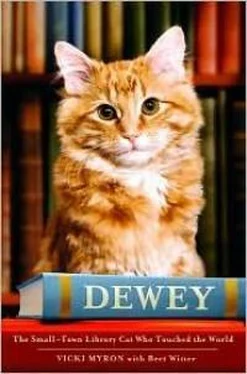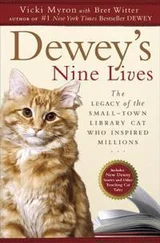How much of an impact can an animal have? How many lives can one cat touch? How is it possible for an abandoned kitten to transform a small library into a meeting place and tourist attraction, inspire a classic American town, bind together an entire region, and eventually become famous around the world? You can’t even begin to answer those questions until you hear the story of Dewey Readmore Books, the beloved library cat of Spencer, Iowa.

Chapter 1
The Coldest Morning
January 18, 1988, was a bitterly cold Iowa Monday. The night before, the temperature had reached minus fifteen degrees, and that didn’t take into account the wind, which cut under your coat and squeezed your bones. It was a killing freeze, the kind that made it almost painful to breathe. The problem with flat land, as all of Iowa knows, is that there’s nothing to stop the weather. It blows out of Canada, across the Dakotas, and straight into town. The first bridge in Spencer across the Little Sioux, built in the late 1800s, had to be taken down because the river became so jammed with ice everyone worried the pylons would collapse. When the town water tower burned down in 1893—the straw packing used to keep the riser pipe from freezing caught fire, and all the nearby fire hydrants were frozen solid—a two-foot-thick, ten-foot-wide circle of ice slid out the top of the tank, crushed the community recreation center, and shattered all over Grand Avenue. That’s winter in Spencer for you.
I have never been a morning person, especially on a dark and cloudy January day, but I have always been dedicated. There were a few cars on the road at seven thirty, when I drove the ten blocks to work, but as usual mine was the first car in the parking lot. Across the street, the Spencer Public Library was dead—no lights, no movement, no sound until I flipped a switch and brought it to life. The heater switched on automatically during the night, but the library was still a freezer first thing in the morning. Whose idea was it to build a concrete and glass building in northern Iowa? I needed my coffee.
I went immediately to the library staff room—nothing more than a kitchenette with a microwave and a sink, a refrigerator too messy for most people’s taste, a few chairs, and a phone for personal calls—hung up my coat, and started the coffee. Then I scanned the Saturday newspaper. Most local issues could affect, or could be affected by, the library. The local newspaper, the Spencer Daily Reporter , didn’t publish on Sunday or Monday, so Monday was catch-up morning for the Saturday edition.
“Good morning, Vicki,” said Jean Hollis Clark, the assistant library director, taking off her scarf and mittens. “It’s a mean one out there.”
“Good morning, Jean,” I said, putting aside the paper.
In the center of the staff room, against the back wall, was a large metal box with a hinged lid. The box was two feet high and four feet square, about the size of a two-person kitchen table if you sawed the legs in half. A metal chute rose out of the top of the box, then disappeared into the wall. At the other end, in the alley behind the building, was a metal slot: the library’s after-hours book return.
You find all kinds of things in a library drop box—garbage, rocks, snowballs, soda cans. Librarians don’t talk about it, because it gives people ideas, but all libraries deal with it. Video stores probably have the same problem. Stick a slot in a wall and you’re asking for trouble, especially if, as it did at the Spencer Public Library, the slot opened onto a back alley across the street from the town’s middle school. Several times we had been startled in the middle of the afternoon by a loud pop from the drop box. Inside, we’d find a firecracker.
After the weekend, the drop box would also be full of books, so every Monday I loaded them onto one of our book carts so the clerks could process and shelve them later in the day. When I came back with the cart on this particular Monday morning, Jean was standing quietly in the middle of the room.
“I heard a noise.”
“What kind of noise?”
“From the drop box. I think it’s an animal.”
“A what?”
“An animal. I think there’s an animal in the drop box.”
That was when I heard it, a low rumble from under the metal cover. It didn’t sound like an animal. It sounded more like an old man struggling to clear his throat. But I doubted it was an old man. The opening at the top of the chute was only a few inches wide, so that would be quite a squeeze. It was an animal, I had little doubt of that, but what kind? I got down on my knees, reached over to the lid, and hoped for a chipmunk.
The first thing I felt was a blast of freezing air. Someone had jammed a book into the return slot, wedging it open. It was as cold in the box as it was outside; maybe colder, since the box was lined with metal. You could have kept frozen meat in there. I was still catching my breath when I saw the kitten.
It was huddled in the front left corner of the box, its head down, its legs tucked underneath it, trying to appear as small as possible. The books were piled haphazardly to the top of the box, partially hiding it from view. I lifted one gingerly for a better look. The kitten looked up at me, slowly and sadly. Then it lowered its head and sank down into its hole. It wasn’t trying to appear tough. It wasn’t trying to hide. I don’t even think it was scared. It was just hoping to be saved.
I know melting can be a cliché, but I think that’s what actually happened to me at that moment: I lost every bone in my body. I am not a mushy person. I’m a single mother and a farm girl who has steered her life through hard times, but this was so, so . . . unexpected.
I lifted the kitten out of the box. My hands nearly swallowed it. We found out later it was eight weeks old, but it looked no more than eight days old, if that. It was so thin I could see every rib. I could feel its heart beating, its lungs pumping. The poor kitten was so weak it could barely hold up its head, and it was shaking uncontrollably. It opened its mouth, but the sound, which came two seconds later, was weak and ragged.
And cold. That’s what I remember most, because I couldn’t believe a living animal could be so cold. It felt like there was no warmth at all. So I cradled the kitten in my arms to share my heat. It didn’t fight. Instead, it snuggled into my chest, then laid its head against my heart.
“Oh, my golly,” said Jean.
“The poor baby,” I said, squeezing tighter.
“It’s adorable.”
Neither of us said anything for a while. We were just staring at the kitten. Finally Jean said, “How do you think it got in there?”
I wasn’t thinking about last night. I was only thinking about right now. It was too early to call the veterinarian, who wouldn’t be in for an hour. But the kitten was so cold. Even in the warmth of my arms, I could feel it shaking.
“We’ve got to do something,” I said.
Jean grabbed a towel, and we wrapped the little fellow up until only its nose was sticking out, its huge eyes staring from the shadows in disbelief.
“Let’s give it a warm bath,” I said. “Maybe that will stop the shivering.”
I filled the staff room sink with warm water, testing it with my elbow as I clutched the kitten in my arms. It slid into the sink like a block of ice. Jean found some shampoo in the art closet, and I rubbed the kitten slowly and lovingly, almost petting it. As the water turned grayer and grayer, the kitten’s wild shivering turned to soft purring. I smiled. This kitten was tough. But it was so very young. When I finally lifted it out of the sink, it looked like a newborn: huge lidded eyes and big ears sticking out from a tiny head and an even smaller body. Wet, defenseless, and meowing quietly for its mother.
Читать дальше













